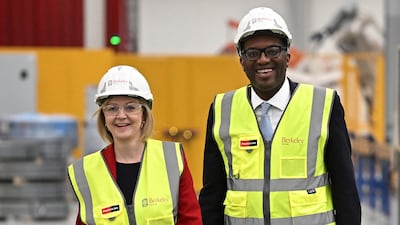Liz Truss has vowed to “usher in a decade of dynamism” as she defended her government’s controversial tax cuts amid criticism that they disproportionately benefit the rich.
Labour accused the Prime Minister and Chancellor of the Exchequer Kwasi Kwarteng of gambling with people’s finances in “casino economics”, and said their “trickle-down” approach would leave the next generation worse off.
But Ms Truss insisted she was “unapologetic” in “focusing relentlessly on economic growth”, even as the £45 billion ($48.86bn) tax-slashing package sent the pound tumbling to 37-year lows and sparked a backlash among some of her own MPs.
Using more than £70bn of increased borrowing, Mr Kwarteng on Friday unveiled the biggest programme of tax cuts for 50 years, including abolishing the top rate of income tax for the highest earners.
The Resolution Foundation think tank said Mr Kwarteng’s package would do nothing to stop more than two million people falling below the poverty line.
Analysis of the mini-budget by the think tank said “only the very richest households in Britain” would see their incomes grow as a result of the cuts.
The wealthiest 5 per cent will see their incomes grow by 2 per cent next year (2023-2024), while the other 95 per cent of the population will get poorer as the crisis in the cost of living continues.
The Institute of Fiscal Studies said only those with incomes of more than £155,000 would be net beneficiaries of tax policies announced by the Conservatives over the current Parliament, with the “vast majority of income tax payers paying more tax”.

“If you’ve got less than about £150,000 a year coming in, if you’re part of the 99 per cent with less than £150,000 coming in, then you’re still going to be worse off as a result of tax changes coming in over the next two or three years,” IFS director Paul Johnson told the BBC on Saturday.
But Ms Truss defended her high-risk strategy, which she said was designed to revive the UK’s stagnant economy.
“Growth means families have more money in their pockets, more people can work in highly paid jobs and more businesses can invest in their future," she wrote in an opinion piece for The Mail on Sunday.
"It provides more money to fund our public services, like schools, the NHS [National Health Service] and the police.
“We will be unapologetic in this pursuit … everything we do will be tested against whether it helps our economy to grow or holds it back.”
Repeating her pledge to do things differently from previous Conservative administrations, Ms Truss said: “We will usher in a decade of dynamism by focusing relentlessly on economic growth.
“The UK has one of the lowest levels of debt in the G7, but we have one of the highest levels of taxes. Currently, we have a 70-year high in our tax rates.”
Mr Kwarteng said he looked forward to “proving the naysayers wrong” over his “mission to encourage investment and drive growth”.
“I want to reassure you that with our growth plan everyone wins. This is a plan that cuts taxes for all, not just the wealthy,” the Chancellor wrote in The Sun.
“With this intervention, we will turbocharge the economy, creating more businesses, jobs and raised living standards, which will directly benefit every single person.”


